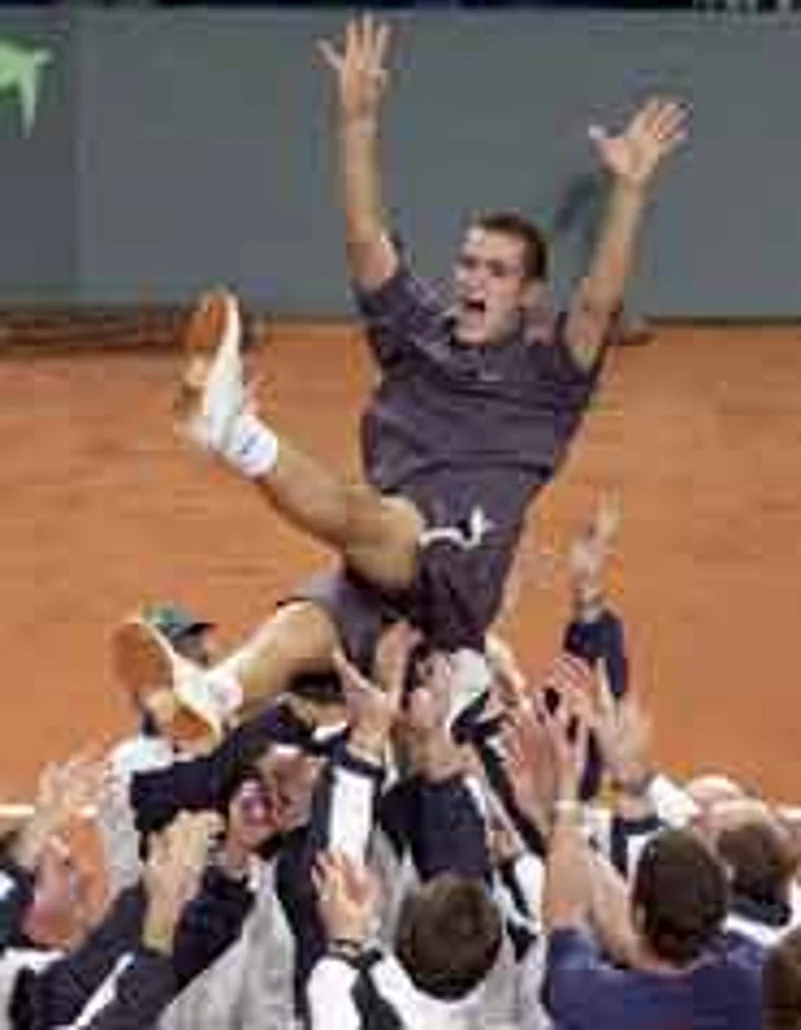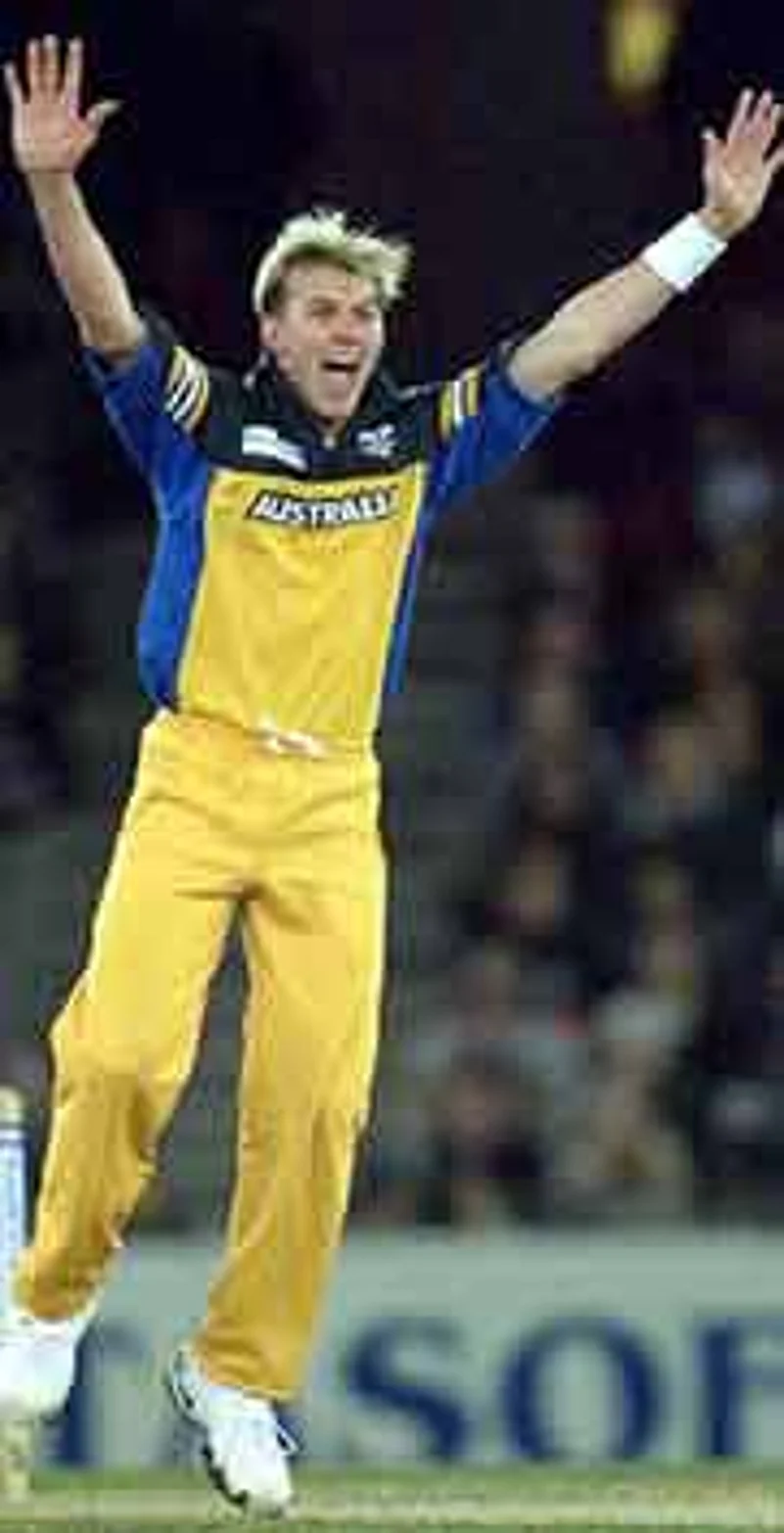Flawed Genius

Dhanraj Pillay is, unarguably, the most skilled current Indian hockey player. He is also, arguably, themost temperamental. It was for the first reason that he was declared the player of the tournament in the 2002Champions Trophy in September and was one of the 12 nominees for the International Hockey Federation men’splayer of the year award for 2002. It was for the second reason, some scribes say, that he lost out on theaward, to Michael Green of Germany.
About a fortnight before the December 5 polling, Pillay found himself on the wrong side of the umpiresduring the final of a domestic hockey tournament. Playing for Indian Airlines (IA) against Punjab Police (thetwo best sides in the country today, with a fair sprinkling of national players), Pillay repeatedly clashedwith the umpires over calls that were definitely not blatantly biased, as the mercurial Indian forward andother IA players would have one believe.
Advertisement
The dispute was tragic because it was a classic match-up of two contrasting styles - IA playing a fast,flowing game and Punjab Police playing the patient, waiting game, relying mostly on counter-attacks - andPillay was, well, vintage Pillay. He consistently ran circles around the defenders with his dazzlingstick-work and bursts of speed. He drew the Punjab Police players like a pack of flies, in the process freeingup the other IA forwards. But the goals eluded IA, as the policemen went ahead on the counter-attack. IA hadthe offensive dominance right through the match, yet always trailed.
Perhaps, it was this discrepancy in the score line that hurt Pillay. The hard tackles and stick checksstarted to niggle. He protested, he spewed angry words towards the umpire, and got a green card (a warning) inreturn. After another vain plea for a penalty corner, he slammed his stick into the turf in disgust. Yellowcard (temporary suspension). Regulation ended at 2-2, and the match went into overtime.
Advertisement
Things got to a boil when Punjab Police won the match with a ‘golden goal’, scored though a penaltycorner, which the Airlines players again disputed, really more out of desperation than out of conviction.Pillay erupted again. This time, his teammates also followed, and so did the 3000-strong crowd, many of whomthreatened to flog the umpires in due course!
Subsequently, the two umpires, Satinder Sharma and Javed Sheikh, lodged a complaint with the Indian HockeyFederation against Pillay’s unruly conduct. Curiously, at Perth, where the panel of coaches and journalistshad assembled to vote for the award, photocopies of news items describing the unsavoury incident surfaced,which didn’t do Pillay’s cause any good. The plot got thicker, as a couple of days later the two umpireswithdrew their complaint, even offered generous words for Pillay the player.
It remains a matter of conjecture whether it was this unsportsmanlike behaviour that scuttled Pillay’schances. What is irrefutable, though, is that he’s a special player -- a beautiful blend of skill, flair,speed, attitude and commitment. Crowds dote on him and opponents fear him. He has done an immense amount forIndian hockey. If only, he would dodge such controversies with the same deftness with which he handlesopponents, and instead channelise the angst into his game, Dhanraj Pillay and Indian hockey would be so muchmore better off.

The Davis Cup, in its 102-year-old history, has been the stage for many extraordinary moments in tennis.Russia’s first title win, over France last weekend, added another chapter to this illustrious tourney’slegendary reputation to script the unlikeliest of stories -- in this case, one heart-rendering, anotherheart-breaking. With the mantle of the world’s best tennis playing nation up for grabs, a pair of20-year-olds, with a world ranking in the 30s but with precious little to show for Davis Cup experience,stepped on to the red clay at Bercy, France, to break the deadlock. Drafted in by default, they had been askedto play the match of their lives.
Advertisement
Russia’s Mikhail Youzhny was up against long odds: he was a last-minute replacement for veteran YevgenyKafelnikov (who pulled out after a draining doubles tie the previous day), he was playing his first ‘live’Davis Cup rubber and had a dismal 1-4 record in ‘dead’ ties, he was playing before a partisan Frenchcrowd, and his team was carrying the burden of losing both its previous two Cup finals. Probably, his onlysource of comfort was that his opponent, Paul-Henri Mathieu, was as much of a Davis Cup novice as him.However, Mathieu came out firing. The odds got longer for Youzhny after an hour-and-a-half, when he foundhimself down two sets -- never in the Cup’s history had any man come back from two sets down to win thefifth rubber of a final. The French crowd was readying for a celebration.
Advertisement

And then, the unexpected happened. As he was to later reveal, Youzhny remembered the old adage: it’s notover till its over. He just kept playing, amid fervent vocal support from his teammates and a small Russiancontingent, led by ardent, long-time supporter former president Boris Yeltsin. Youzhny started to claw backinto the match, and got some momentum going. Three hours later, Youzhny had won, and he found himself in theembrace of teammates and Yeltsin, who later proclaimed that he was the "talisman" for the team. Russia hadwon its first Davis Cup title, and buried many ghosts from the past.
A memorable, come-from-behind win for the Russians, but spare a thought for Mathieu. Just 20, playing hisfirst Davis Cup tie, it had been a baptism by fire for him. Playing only because regular starter ArnaudClement was struggling with a wrist injury, Mathieu gave a good account of himself, stretching Marat Safin tofour sets and almost pulling it off against Youzhny. Defeat was cruel, knowing that a nation’s hopes hadcome crashing down along with his, knowing that he was so close to being the biggest hero in town. Histeammates knew the state of his ravaged mind, and offered cold words of comfort. "That's sport. There arehappy days and there are bad days," said Nicolas Escude.
Advertisement
It had been another weekend of drama and intrigue, of tales of valour and courage, of little men doing bigthings. Just another Davis Cup weekend. Next year promises to be even better. The Aussies, led by LleytonHewitt, are back in the world group after a year’s hiatus; the French will be looking to set the recordstraight; the Spanish Armada will be out in full force; and the US, with Andy Roddick and James Blake in theirranks, are finally beginning to look like a team. The Russians? Well, they’ll be there, though next yearwill probably be the last thought in their minds now, as they savour the heady feel of success.
Advertisement
Fast and Furious

Like most flamboyant performers, Brett Lee revels in the spotlight. He loves it when the world’s eyes aretrained on him, watching every move he makes. In the third Ashes test at Perth, he barely made a move wrong.Bowling: he grabbed five of the 16 wickets to fall in the English capitulation (four less than 20 because MarkButcher and Michael Vaughan took turns running each other out; paceman Chris Silverwood faithfully played bythe English script, suffered a series-ending injury early on in the test, and so didn’t bat the second timearound; Alex Tudor retired hurt after being felled by a Lee special). Batting: when Australia was looking toget a move on so as to give England a nervous hour of batting on the second evening, Lee smashed a run-a-ball41. Fielding: it was his fumble and subsequent recovery that ran out English batting lynchpin Vaughan. That’swhat the match scorecard will tell.
Advertisement
What it won’t tell is that Lee’s contribution to the English decimation was as much psychological asphysical. It all started when the Australian selectors and Steve Waugh picked Lee over Andy Bichel, who haddone little wrong in the first two tests. By doing so, they implicitly gave the strapping, blond paceman atwo-word brief: bowl fast.
Bowl fast, he did. With an ally in the fast, bouncy WACA pitch and a stage tailormade for his exuberantself to express himself, Lee thundered in with deliveries consistently over 90 miles per hour (mph), andtargeted ever so often at the batsmen’s ribcage. It was an exhibition of raw, pure, rhythmic fast bowlingthat had the English batsmen ducking, fending, bobbing, weaving. He also strayed, overpitched, went for runs,but kept reminding the batsmen that he was on their case with brutish deliveries.
Advertisement
It’s that fear factor that Brett Lee, especially when he is on song, brings to the field. Lee’s forteisn’t consistency. Or line and length. Or accuracy. Unlike McGrath, he doesn’t tease and torment, and playwith the batsmen’s patience outside the off-stump. Unlike Gillespie, he doesn’t quite consistently manageto hit the seam, which causes the ball to hurry through. Lee is more direct, straight, to the point. A blitzof pace and fury.
It was a point ably demonstrated by Hawk-Eye, a revolutionary technology for ball-tracking analysis used BySky Sports during the Perth test. Lee averaged a speed of 92 mph during the match. At this speed, a batsmanhas a reaction time of 0.462 of a second before having to play the ball. Hawk-Eye also deconstructed speed.Gillespie averaged 88 mph, while McGrath was around 84 mph. According to Hawk-Eye, at the point when a batsmanwould make contact with the Lee delivery, Gillespie’s was a yard behind, and McGrath’s a further yardbehind.
Advertisement
By no means is this comparison meant to underscore the importance of line and length -- McGrath andGillespie are superior bowlers than Lee by a long mile. But it just shows why the likes of Lee and ShoaibAkhtar prove to be an ugly proposition for batsmen uncomfortable with sheer pace -- and there are many outthere. Alex Tudor is one from that club.
In the first innings, Tudor, unintentionally, used the splice of his bat to fend off some nasty Leecorkers, as he often took his eyes of the ball. Then, when it was Lee’s turn to bat, Tudor made the carnalsin of bouncing at a fellow fast bowler. When Tudor turn came into bat the second time around, it was Lee’sturn to get back. Again, Tudor was taking his eyes of the ball and getting into awkward positions, and one Leethunderbolt found its way between Tudor’s visor and the helmet peak, and crashed above his right eye. It wasa horrifying sight to see Tudor double over and collapse in a heap.
Advertisement
It just summed up the third test and the visitors’ Ashes campaign. England have been bruised andbattered, their spirits broken. It doesn’t really matter whether Australia play Lee or Bichel, whether theyare captained by Steve Waugh or Ricky Ponting, whether they play at Perth or Sydney. This Australian cricketside is playing some darned good cricket -- collectively.
Tailpiece
In the wake of the English rout, there are plenty of jibes being poked at English cricket. Here are five ofthe many "compelling" reasons given by Australian newspaper The Age why Australia and Englandshould continue to play and why we should continue to watch them play. It was published before the Perth test,but all the same it scores the point of the gross mismatch that this Ashes contest is.
Advertisement
- "If he gets someone out in Perth, Matthew Hoggard will be on a hat-trick -- a wicket in threeconsecutive test matches.
- England has been the clear-cut winner on two days. Three more good days and it can claim a cumulative Testvictory.
- Don't tell me you are sick of that inspiring ‘Barmy Army, Barmy Army, Barmy Army, Barmy Army, Barmy Army’chant already.
- Qantas now relies heavily on the bookings of replacement England players to turn a profit.
- OK, it's not the most competitive series. But things are sure to pick up when Bangladesh arrives nextAugust."




















